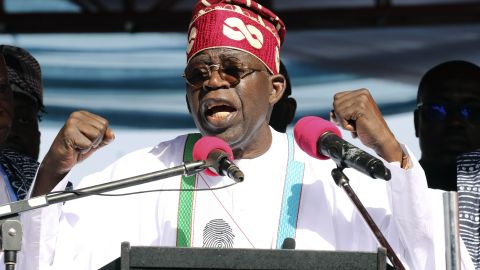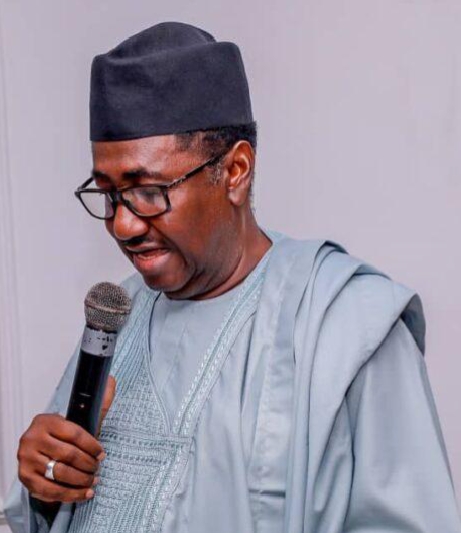An Open Letter to His Excellency, President Bola Ahmed Tinubu. From Chidi Ekeh

An Open Letter to His Excellency, President Bola Ahmed Tinubu.

Your Excellency,
As a concerned Nigerian, I write to you with a heart full of hope, tempered by the urgency of our nation’s challenges. Your administration, which assumed office on May 29, 2023, has embarked on a transformative journey, marked by bold reforms and ambitious projects that signal a resolute commitment to Nigeria’s progress. Your courage in confronting longstanding structural issues—economic distortions, infrastructure deficits, and systemic inefficiencies—deserves commendation. However, the road to sustainable development demands unwavering focus, transparency, and decisive action to address pressing issues like insecurity, hunger, and political distractions. This letter acknowledges your achievements, reflects on the potential of your reforms, and offers candid suggestions to ensure your legacy as a leader who reshaped Nigeria for generations to come.
Acknowledging Your Good Works
Your administration’s achievements in less than two years are noteworthy, particularly in infrastructure, health, and economic restructuring. The Renewed Hope Infrastructure Development Fund (RHIDF), approved in March 2024, is a visionary initiative, mobilizing N20 trillion ($14.5 billion) to fast-track projects in roads, rail, ports, and energy. Flagship projects like the Lagos-Calabar Coastal Highway (750km), Sokoto-Badagry Superhighway (1,068km), and Calabar-Ebonyi-Benue-Nasarawa-Abuja Superhighway (118.85km) demonstrate an unprecedented commitment to connectivity. These projects, if completed, will reduce logistics costs (currently 16–20% of GDP), create jobs, and boost GDP growth, which reached 3.86% in Q3 2024—the fastest in three years.
In healthcare, the Nigeria Health Sector Renewal Investment Initiative (NHSRII), unveiled in November 2023, has mobilized over $3 billion, including a $1.57 billion World Bank facility for the HOPE-PHC program to rehabilitate 17,600 primary healthcare centers (PHCs). The doubling of the Basic Health Care Provision Fund (BHCPF) to N37 billion in 2024 and a 10% rise in vaccination rates by Q3 2024 reflect progress toward universal health coverage. The NSIA Healthcare Expansion Programme, launched in August 2024, promises 10 world-class oncology and diagnostic centers, addressing the rising burden of non-communicable diseases like cancer (27% of deaths).
Your anti-corruption stance, exemplified by the suspension of Humanitarian Affairs Minister Betta Edu in January 2024, signals a zero-tolerance approach, drawing on your Lagos governorship legacy of eliminating ghost workers. Internationally, your advocacy for intra-Commonwealth trade and an African UN Security Council seat has elevated Nigeria’s global standing. These achievements, Your Excellency, lay a foundation for a prosperous Nigeria, and I join millions in applauding your vision.
Courage in Bold Reforms
Your reforms reflect a rare courage to tackle Nigeria’s entrenched challenges head-on. The removal of the fuel subsidy, announced on your inauguration day, was a bold stroke to end a $10 billion annual drain on public finances. By redirecting savings to infrastructure and social programs, you’ve aligned with global best practices, earning praise from the World Bank. The foreign exchange market liberalization, unifying multiple exchange rates, has curbed arbitrage, attracted foreign investment, and enabled profit repatriation for multinationals. These policies, though painful, address distortions that stifled growth for decades.
The Access to Higher Education Act (June 2023), providing interest-free student loans, and the National Commodity Board to stabilize food prices demonstrate a commitment to human capital and food security. Your security efforts, with over 9,300 bandits and insurgents neutralized by October 2024, reflect a determination to restore peace. These reforms, Your Excellency, showcase a leader unafraid to make tough decisions for Nigeria’s long-term prosperity.
The Positive Impact of Your Reforms, If Fully Implemented
If carried out with transparency, speed, and accountability, your reforms and projects could transform Nigeria’s economy and society. Below, I outline their potential impacts:
Economic Transformation:
Fuel Subsidy Removal and Forex Liberalization: Full implementation, coupled with transparent reallocation of savings, could save $10–15 billion annually, funding infrastructure and social welfare. A stable forex market, supported by increased oil production (targeted at 2.06 million barrels/day in 2025), could attract $20 billion in foreign direct investment (FDI) by 2027, up from $3.9 billion in 2024. This would strengthen the naira, reduce inflation (34.6% in 2024), and lower import costs.
Infrastructure Boom: Completing the Lagos-Calabar, Sokoto-Badagry, and other highways by 2027 could reduce logistics costs by 5–7%, boosting GDP by 2–3% annually. The RHIDF’s focus on rail (e.g., Kano-Kaduna Railway) and ports (Lagos, Onne) could increase trade volumes by 30%, positioning Nigeria as a West African hub.
Energy Gains: Sustained power sector reforms, building on the 5,713 MW peak in March 2025, could achieve 10,000 MW by 2027, reducing business costs and creating 500,000 jobs in manufacturing. The Rural Access and Agricultural Marketing Project (RAAMP-SU) could benefit 4 million rural residents, cutting post-harvest losses by 20%.

Social Development:
Healthcare Access: The NHSRII and HOPE-PHC, if fully funded, could halve maternal mortality (814 per 100,000 live births) and under-five mortality (132 per 1,000) by 2030. Upgrading 17,600 PHCs with climate-resilient infrastructure would ensure 80% of Nigerians access quality care, reducing out-of-pocket costs (70% of health spending).
Education and Youth Empowerment: Scaling the student loan scheme could increase tertiary enrollment by 30%, producing 1 million graduates annually by 2030. This would address youth unemployment (53.4%) and drive innovation.
Security and Food Security:
Tackling Marauding Herdsmen: Resolving the farmer-herder crisis, which displaces 2 million annually and costs $14 billion in agricultural losses, is critical. Your administration’s ranching initiatives and land bank activations are promising, but a comprehensive strategy—integrating community dialogue, modernized livestock systems, and robust security—could restore 10 million hectares of farmland, boosting food production by 25%.

Addressing Debilitating Hunger: With 40.5% food inflation and 31 million Nigerians food-insecure, scaling the National Commodity Board and agricultural investments (N3.73 trillion in 2025) could stabilize prices and achieve self-sufficiency in rice, maize, and wheat by 2028. This would reduce hunger by 50%, lifting 15 million out of poverty.
Global Competitiveness: Your Commonwealth advocacy and trade-focused diplomacy could increase intra-African trade by 10%, adding $5 billion to exports. A revitalized mining sector, supported by transparent licensing, could generate $10 billion annually from solid minerals, diversifying revenue from oil (80% of exports).
These outcomes hinge on transparency (public disclosure of project costs and contracts), speed (adhering to timelines, e.g., Lagos-Calabar Highway completion by 2027), and accountability (sanctioning delays or corruption). Without these, public trust—already strained by inflation and protests in 2024—will erode, undermining your reforms’ impact.
Addressing Political Distractions: 2027 Campaigns and Defections
Your Excellency, as 2027 approaches, political maneuvering threatens to divert focus from governance. The early campaigns for 2027, with APC leaders like Senator Orji Uzor Kalu declaring you the party’s sole candidate, risk alienating Nigerians grappling with economic hardship. These campaigns, coupled with indiscriminate defections into the APC, send a troubling signal that political expediency trumps principle. The reported defection of figures like Nasir El-Rufai to the SDP and coalition talks among Atiku Abubakar, Peter Obi, and Rabiu Kwankwaso underscore the fluidity of Nigeria’s political landscape, driven by ambition rather than ideology.
I urge you to halt unnecessary 2027 campaigns within the APC. Nigerians expect governance, not politicking, especially when 34.6% inflation and 53.4% youth unemployment dominate daily life. Your achievements—roads, healthcare, power—should speak for you in 2027, not premature rallies. By focusing on deliverables, like commissioning Abuja’s infrastructure projects by May 2025, you can rebuild public trust and render opposition narratives irrelevant.
Regarding defections, the APC’s open-door policy risks diluting its brand. The influx of politicians, many with questionable records, undermines your anti-corruption legacy. I respectfully suggest setting a threshold for defectors, requiring:
Transparency: Public disclosure of their assets and funding sources.
Development Track Record: Evidence of tangible contributions in prior roles (e.g., infrastructure, job creation).
Alignment with APC Values: Commitment to your Renewed Hope Agenda’s principles of accountability and progress.
By enforcing such standards, the APC can distinguish itself as a party of integrity, not a haven for opportunists. This will counter public cynicism, as seen on X, where users lament “recycled politicians” joining the APC without scrutiny. A principled stance will strengthen your party’s moral authority and deter frivolous defections, ensuring only those aligned with Nigeria’s progress join your ranks.
A Call for Ruthless Accountability
Your Excellency, the success of your reforms depends on the competence and diligence of your appointees. While many have performed admirably, lapses in critical sectors—security, agriculture, mining, and power—threaten your vision. I urge you to adopt a ruthless approach to accountability, holding your employees to the highest standards. Specific recommendations include:
Security Chiefs:
Context: Despite neutralizing 9,300 bandits and arresting 7,000 by October 2024, insecurity persists. Kidnappings in Zamfara, Boko Haram attacks in Borno, and IPOB violence in the South-East disrupt lives and elections (2023 saw attacks on INEC offices). The farmer-herder crisis, costing $14 billion annually, fuels hunger and displacement.
Action: Evaluate security chiefs quarterly, using metrics like incident reduction rates and conviction rates for perpetrators. Replace underperforming leaders swiftly, as you did with Betta Edu. Deploy technology (drones, surveillance) to complement the 400,000 personnel planned for 2027 election security. Engage communities to resolve herder-farmer conflicts, enforcing ranching laws and prosecuting offenders.
Impact: Decisive action could reduce violent incidents by 40%, enabling safe farming and boosting food production, critical for addressing hunger.
Minister of Agriculture and Food Security:
Context: Food inflation (40.5%) and 31 million food-insecure Nigerians reflect agricultural underperformance. Despite N3.73 trillion allocated in 2025, post-harvest losses (30–40%) and insecurity hinder progress.
Action: Demand monthly progress reports on land bank activation, irrigation systems, and farmer support programs. Sanction delays in disbursing funds to smallholder farmers (70% of agricultural output). Accelerate the National Commodity Board to stabilize prices and ensure strategic food reserves reach vulnerable populations.
Impact: Effective execution could cut food inflation by 15%, reduce hunger by 50%, and create 2 million rural jobs by 2027.
Minister of Solid Minerals Development:
Context: Nigeria’s mining sector, with $10 billion potential, is plagued by illegal mining and licensing opacity. Artisanal mining accidents (e.g., October 2024 explosion in Oyo) highlight regulatory failures.
Action: Enforce transparent licensing, publish revenue data, and formalize artisanal miners into cooperatives. Set a 2026 target to double mineral exports ($1.2 billion in 2024). Replace the minister if milestones are missed.
Impact: A revitalized mining sector could generate 500,000 jobs and diversify revenue, reducing oil dependency (80% of exports).
Minister of Power:
Context: The 5,713 MW peak in March 2025 is progress, but outages persist, costing businesses $29 billion annually. Tariff hikes have not translated to consistent supply.
Action: Set a 2026 target of 8,000 MW, with clear timelines for transmission upgrades. Audit distribution companies (DisCos) for efficiency and sanction underperformance. Accelerate rural electrification under RAAMP-SU to benefit 4 million residents.
Impact: Reliable power could boost manufacturing by 20%, creating 1 million jobs and supporting your industrial agenda.
Your Excellency, ruthless accountability is not punitive but a necessity to deliver on your promises. By holding security chiefs and ministers to measurable outcomes, you will inspire confidence and deter complacency. Nigerians, weary of unfulfilled pledges, will rally behind a leader who demands excellence from his team.
Addressing Marauding Herdsmen and Hunger
The farmer-herder crisis and hunger are existential threats requiring urgent action. The crisis, rooted in resource competition and climate change, displaces 2 million annually and disrupts farming in the North and Middle Belt. Your administration’s ranching initiatives and security deployments are steps forward, but a holistic strategy is needed:
Community Dialogue: Convene traditional rulers, herders, and farmers to negotiate grazing routes and ranching adoption, with federal funding for pilot ranches in 10 states.
Security Enforcement: Deploy task forces to disarm armed herders, prosecuting offenders to deter violence. Use satellite monitoring to track herds and prevent clashes.
Economic Integration: Train herders in modern livestock practices, linking them to dairy and meat value chains, creating 100,000 jobs.
On hunger, the National Commodity Board and agricultural investments are critical. Accelerate:
Subsidized Inputs: Distribute seeds, fertilizers, and tractors to 5 million smallholder farmers by Q3 2025, targeting 20% yield increases.
Storage Infrastructure: Build 50 food storage facilities by 2026 to cut post-harvest losses by 20%.
Social Safety Nets: Expand cash transfers (N1.13 trillion in 2025) to 15 million households, ensuring transparent delivery to curb corruption.
These measures could restore 10 million hectares of farmland, reduce food inflation by 15%, and lift 15 million out of hunger by 2027, reinforcing your Renewed Hope Agenda’s social contract.
The Path Forward
Your Excellency, your reforms and projects position Nigeria for a renaissance, but their success depends on focus and discipline. By halting premature 2027 campaigns, you can prioritize governance, letting achievements like the Third Mainland Bridge rehabilitation and 5,713 MW power peak speak for you. Setting standards for APC defectors will restore public trust, countering cynicism about recycled politicians. Ruthless accountability for security chiefs and ministers will ensure deliverables, while decisive action on herdsmen and hunger will address Nigerians’ immediate needs.
Transparency—publishing project costs, timelines, and performance metrics—will build confidence, as seen in Lagos under your governorship. Speed, by adhering to deadlines (e.g., Abuja infrastructure by May 2025), will demonstrate competence. Your legacy, Your Excellency, lies not in political maneuvering but in tangible outcomes: roads connecting communities, hospitals saving lives, farms feeding millions, and a secure Nigeria where dreams thrive.
Conclusion
I write not as a critic but as a patriot who believes in your vision. Your courage has set Nigeria on a path of renewal, but the journey requires unwavering focus. By addressing political distractions, enforcing accountability, and tackling insecurity and hunger, you can deliver a Nigeria that fulfills its potential. I urge you to lead with the same tenacity that transformed Lagos, knowing that millions stand with you, hopeful for a brighter future.
Thank you for your service, Your Excellency. May your leadership inspire generations, and may Nigeria rise under your stewardship.
Yours respectfully,
Chidi Ekeh an Engineer and Public affairs analyst writes from Abuja




